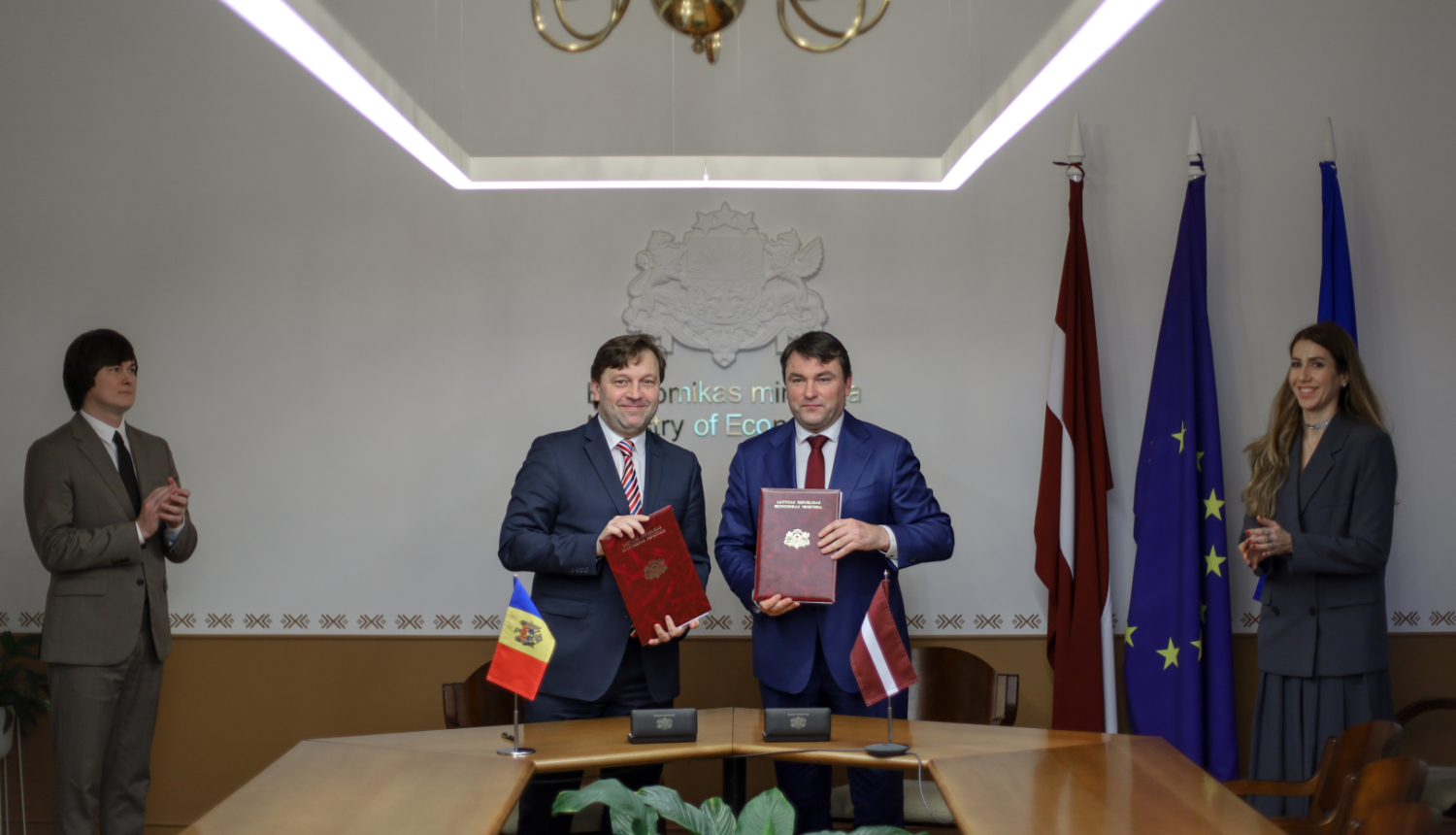Translated using ChatGPT service.
On January 29, 2025, in Riga, the 4th session of the Latvia-Moldova Intergovernmental Commission on Economic, Industrial, Scientific, and Technical Cooperation (hereinafter - IGC) took place. On the Latvian side, the IGC was chaired by the State Secretary of the Ministry of Economics, Edmunds Valantis, while on the Moldovan side, it was chaired by the Deputy Prime Minister of the Republic of Moldova, Minister of Economic Development and Digitalization, Dumitru Alaiba.
The State Secretary of the Ministry of Economics, Edmunds Valantis, addressing the IGC participants, emphasized: "We have engaged in a constructive dialogue, exchanged ideas, and identified areas where we can collaborate to address common challenges and leverage opportunities for growth and development. Let us together succeed in turning our discussions into concrete actions that will promote closer cooperation and growth for both our countries."
During the session, the IGC co-chairs emphasized the desire of both countries to expand economic cooperation, as well as to promote trade and investment ties, especially in the fields of IT/ICT, industry, agriculture, transport, startups, renewable energy, tourism, regional development, and others. Additionally, they discussed knowledge sharing in various sectors, considering Moldova’s path towards EU accession.
The Deputy Prime Minister of the Republic of Moldova, Minister of Economic Development and Digitalization, Dumitru Alaiba, emphasized in the discussions the necessity of creating new partnerships and platforms where entrepreneurs can meet and present their ideas. “Moldova has embarked on an active development path, and we are currently undergoing an intensive transformation process to become a modern European country. Already, 86% of public services are digitalized, and Moldova has an attractive offer for the ICT sector, startups, and the development of other industries. Over 15 years, we have managed to reorient our exports from Russia to the EU, which is now our main trading partner.”
During the discussions, both parties agreed to strengthen cooperation in the areas of energy efficiency and renewable energy, as well as in clean technologies, particularly emphasizing Latvia’s experience and expertise in this field.
Among other things, both parties expressed interest in developing cooperation in agriculture and forestry, particularly highlighting Latvia’s role in Moldova’s agricultural mentoring program as part of its EU accession process.
Furthermore, Latvia expressed interest in enhancing cooperation with Moldova in education and science, including strengthening direct contacts between higher education and research institutions of both countries. Future steps for collaboration in electronic communications and the ICT sector were also discussed, with a particular emphasis on Latvia’s experience and expertise in this field.
The Moldovan side expressed interest in Latvia’s experience and informational support in various areas, including a mutual agreement to foster cooperation in sustainable tourism development by exchanging knowledge and best practices.
During the meeting, Latvia also positively assessed Moldova’s reform process, particularly in relation to its European Union integration efforts.
It is planned that the next, 5th session of the IGC, will take place in the capital of the Republic of Moldova, Chișinău.
As reported, this week, a delegation of Moldovan government representatives and entrepreneurs (representatives from the Ministries of Agriculture, Culture, and Energy, business organizations, the Moldovan Chamber of Commerce and Industry, the Investment Agency, the Academy of Sciences, and the Public Property Agency) arrived in Riga on a working visit, led by the Deputy Prime Minister, Minister of Economic Development and Digitalization of the Republic of Moldova, D. Alaiba.
On January 28, the Latvia-Moldova Business Forum took place, with more than 80 participants in total. During the event, cooperation in the field of information technology was particularly emphasized. Over the past seven years, the ICT industry in Moldova has tripled and continues to develop. 84% of foreign investments in Moldova come from EU member states, with Latvia ranking as the 19th largest investor in Moldova.
During the visit, the Deputy Prime Minister of the Republic of Moldova, Minister of Economic Development and Digitalization, D. Alaiba, met with the Minister of Economics, Viktors Valainis, to discuss opportunities for attracting investments, engaging Latvian experts in various fields in Moldova to support a smoother EU accession process, as well as the IGC’s more active integration as a significant instrument for expanding cooperation and strengthening the dialogue between both countries.
Additionally, as part of the IGC framework, on January 28, a cooperation memorandum was signed between the Latvian Chamber of Commerce and Industry and the Moldovan Chamber of Commerce.
The IGC was established based on an agreement between the government of the Republic of Latvia and the government of the Republic of Moldova on economic, industrial, scientific, and technical cooperation, signed on May 11, 2007, in Riga. Since the signing of the Latvia-Moldova economic cooperation agreement, three intergovernmental commission sessions have taken place. The last session was held on June 9, 2017, in Chișinău, and on October 26, 2020, Latvia-Moldova expert consultations were conducted online.
Moldova ranks as Latvia’s 49th largest export partner and 54th largest import partner. In the first three quarters of 2024, Latvia’s exports to Moldova amounted to 23.8 million euros, while in 2023, Latvia’s exports to Moldova totaled 34 million euros. In 2023, Latvia’s external trade balance with Moldova was positive (23 million euros).
The most important Latvian export goods to Moldova are chemical products (medicines), machinery, mechanisms, electrical equipment, and food products (canned goods, alcoholic beverages). The most imported goods from Moldova include plant-based products (grapes, nuts), food products (wine), as well as machinery, mechanisms, and electrical equipment.




